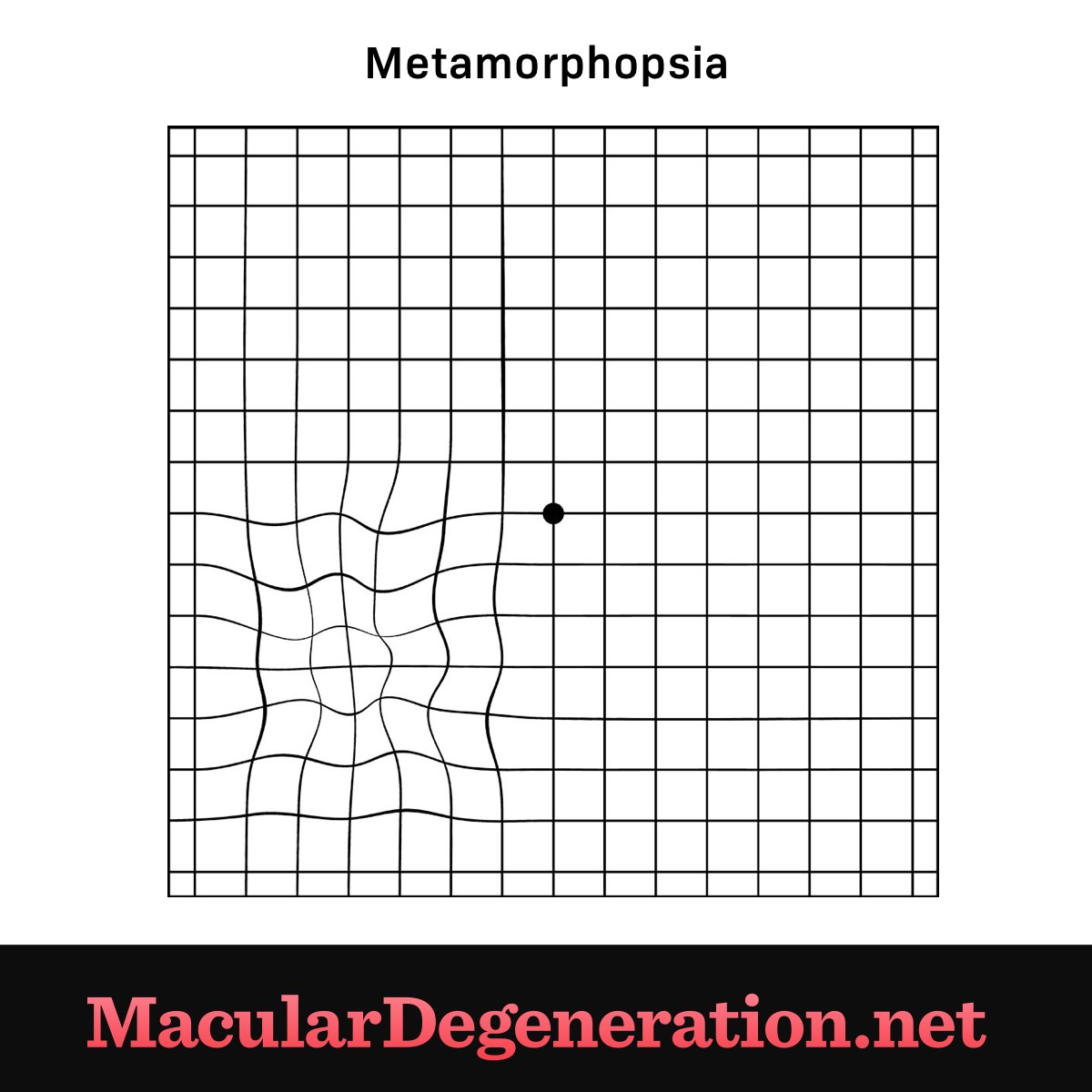Distorted Vision (Metamorphopsia)
Reviewed by: HU Medical Review Board | December 2018 | Last updated: September 2023
Macular degeneration is one of the most common causes of vision loss in individuals, especially over the age of 50. Getting early diagnosis and treatment is important, but for many people, various types of macular degeneration including age-related macular degeneration (AMD), are asymptomatic until the condition is fairly advanced, which is why regular comprehensive dilated eye exams are so important, especially if you’re noticing any abnormal visual symptoms at a younger age.
Stages of AMD
- Early AMD typically does not cause vision loss or other symptoms, even though there are medium-sized drusen present, which are yellow deposits under the retina.1
- Intermediate AMD may cause some vision loss or other symptoms in some people, but not always.1 In this stage, there are usually large drusen in the eye, pigment changes in the retina, or both.1
- Late AMD is when people typically experience noticeable vision loss or other symptoms.
The earlier AMD is diagnosed, the more proactive you can be about healthy lifestyle choices, possible supplementation, and preserving your existing vision.
Symptoms
When macular degeneration does cause symptoms, they can vary, depending on the subtype of the disease. Macular degeneration and its symptoms and treatment can vary widely, and the experience of one person may be markedly different than another. The condition is progressive and affects central vision, leaving peripheral vision largely intact.
AMD and MMD symptoms
Symptoms of AMD and myopic macular degeneration can include2,3:
- Blurry vision
- Trouble reading
- Dark spots or blind spots in central vision
- Objects appear as wrong shape or size
- Colors appear dull, gray, or washed out
- Distorted vision (straight lines may appear wavy)
Stargardt disease symptoms
In Stargardt disease, the main symptoms tend to be:
- Slow, progressive central vision loss
- Blurry or fuzzy vision
- Color blindness
- Light sensitivity4
If you have any of these symptoms, see your eye doctor immediately. These may or may not indicate the presence of macular degeneration.
Distorted vision
In macular degeneration, distorted vision often refers to metamorphopsia, or when straight lines appear wavy. This is noted when a patient looks at the Amsler grid; the lines become noticeably distorted and wavy. Metamorphopsia can cause flat objects to look rounded and is often associated with wet AMD and myopic macular degeneration (which can have symptoms similar to wet AMD).
Causes of distorted vision?
Distorted vision is typically associated with wet AMD. In wet AMD, also called neovascular AMD, abnormal blood vessels grow under the retina. These abnormal vessels are weak and are prone to leakage or hemorrhage, which means they can cause swelling and damage to the macular retina. Abnormal collection of fluid or blood can alter the retinal anatomy, thereby leading to visual distortion or even sudden and severe vision loss.
Diagnosis
In addition to patient self-reporting, an Amsler grid test is an easy way for your eye doctor to see the extent of vision distortion.5 A baseline Amsler grid might be done during macular degeneration screening, and your doctor might have you do a monthly Amsler grid test at home to self-monitor your vision.
Figure 1. Metamorphopsia on an Amsler grid
Treatment
Distorted vision is a symptom of a larger problem, so the underlying cause needs to be treated. In the case of macular degeneration, treatment can vary, depending on the subtype of the disease, the severity of your disease, medical history, overall health, and more.
Treatment might include laser treatment, anti-VEGF injections, nutritional supplements, or surgery. Talk with your doctor to see what your treatment options are for your specific situation.
What can you do?
If you’re experiencing any kind of distorted vision, including having straight lines appear wavy, see your eye doctor. These can be symptoms of a variety of eye conditions, including macular degeneration.
If you have already been diagnosed with macular degeneration and are noticing increased visual distortions, call your doctor. She might want to do more testing to get a more accurate assessment of the progression of your condition, which can then affect your treatment plan. The sooner the distorted vision is checked out, the sooner it can be addressed and hopefully corrected or ameliorated.
